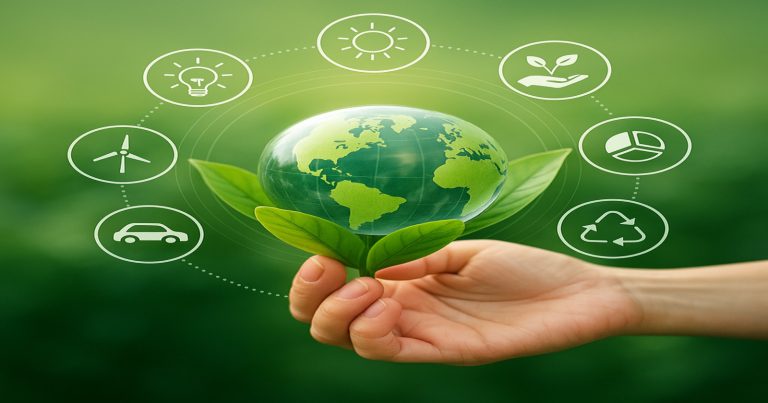The world is facing big problems like pollution, rising inequality, and unstable economies. Because of this, sustainable development is more important than ever. It helps us use resources wisely, protect nature, and create opportunities for everyone. It also makes sure that future generations can meet their own needs. Sustainable development supports long-term well-being. It balances growth with caring for the environment and being fair to all people. As we deal with climate change, loss of wildlife, and fewer natural resources, this model helps build a stronger and safer world. It brings together smart economic plans, care for the planet, and progress for all.
What is Sustainable Development?
Sustainable development refers to a process of strategic planning. Planning that guarantees the current generation. Satisfies its needs without compromising the capacity of future generations to meet theirs. It ensures harmony between economic growth, social inclusion, and environmental protection. It is concerned with the ethical use of natural resources. Also, with minimising ecological harm and making all communities accessible to education, health, and jobs. A sustainable society is productive, equitable, and environmentally aware. For instance, transitioning from fossil fuels to renewable energy is sustainable. It addresses energy needs today yet keeps the environment safe for tomorrow. Likewise, constructing green infrastructure sustains jobs and the planet simultaneously.
Sustainable Development Goals (SDGs)
The Sustainable Development Goals SDGs, taken up by the United Nations in 2015, are a cluster of 17 interrelated objectives. They aim to eliminate poverty, ensure equity, and protect the planet by 2030. They are the template for the world to take action towards sustainability. Every target is an important area where something must be done to build a more just, greener, and peaceful planet. SDGs prioritize universal access to education, water, healthcare, economic opportunity, and environmental justice.
Eradicate Poverty and Hunger
Eliminating hunger and poverty assists in lifting whole communities. It enables them to be productive contributors to the economy and society. It enhances well-being, increases productivity, and builds peace. This objective guarantees the fair availability of food, work, and shelter. It covers social protection, safety nets, and agricultural development schemes. This is to break poverty’s long cycles.
Ensure Quality Education and Health
A good education and good health form the backbone of every prosperous society. Sustainable development maintains universal education with schools, clinics, and fitness programs. These initiatives enhance literacy, disease reduction, and improved life expectancy. Also, enabling subsequent generations to make rational choices regarding sustainability.
Promote Clean Water and Sanitation
Sanitation problems and water shortages pose fundamental challenges to worldwide development and health. Secure water supplies help safeguard people from disease and protect their dignity. These are comprised of investments in water facilities. Local communities champion sanitation education and water conservation measures.
Encourage Renewable and Clean Energy
Shifting to solar, wind, and hydroelectric power decreases the reliance on fossil fuels. It minimises carbon emissions. Green energy is one of the pillars of environmental sustainability. Governments and businesses are urged to invest in clean technology. Primarily to energize cities, homes, and businesses more efficiently and responsibly.
Increase Economic Growth and Employment
Inclusive green economies give equal employment opportunities without undermining natural resources. It is propelled by ethical business practices, secure working environments, and decent wages. Green jobs and social entrepreneurship promote a shock-resistant society. In addition, they are a future-proof workforce.
Fight Climate Change and Its Effects
Global warming is a global emergency that impacts agriculture, biodiversity, water, and health. Low emissions and adaptation investment are imperative actions. This involves global cooperation and the use of carbon-pricing measures. Additionally, preparedness for disaster should be used to protect vulnerable groups.
Significance of Sustainable Development in the Modern World
Sustainable development is not just a long-term goal. It is a good way to solve short-term global and local problems. It builds resilience, equity, and innovation and encourages the conservation of natural ecosystems.
Preserves Resources for Future Generations
Sustainability makes sure that key resources are used. Freshwater, forests, and fertile land will continue to be available for future generations. Sustainability encourages stewardship of the environment and closed resource loops. Examples include rainwater collection and sound mining practice. These sustainable approaches avoid depletion and replenish ecosystems in the long run.
Drives Stable Economic Growth
Economic growth over the long term relies on sound ecosystems, educated labour, and innovation. Sustainable policies encourage all three by building industries that are productive and eco-friendly. Green investments, like those in clean cars or buildings, create jobs and minimise ecological damage. They are translating to economic efficiency.
Supports Social Justice and Inclusion
Sustainable development closes the gap between the poor and the affluent. Mainly by providing access to basic services, decent incomes, and secure living environments. By targeting education, health, and infrastructure in poor areas. Sustainability promotes social mobility and empowerment.
Conserves Ecosystems and Biodiversity
From tropical rainforests to coral reefs, biodiversity is the prime determinant of healthy ecosystems. Conservation of wildlife and afforestation are sustainable activities. They aver the extinction of species and induce ecological balance. Such is the case with India’s Project Tiger and village-level afforestation initiative, perfect examples of sustainability.
Enhances Public Health and Quality of Life
Clean air, clean water, and lower pollution directly affect health outcomes. The population of sustainable living communities tends to have a longer life expectancy and lower disease rates. Waste disposal systems, organic agriculture, and green public transit are all pragmatic examples. It is enhancing everyday life through sustainability.
Principles of Sustainable Development
Principles of sustainable development are the ethical and strategic basis for sustainability, such as oriented policies, planning, and action. They dictate how societies ought to grow in environmental, social, and economic terms. Their inclusion in decisions guarantees development that is just, environmentally oriented, and sustainable in the long term. It is essential for governments, business entities, and citizens to grasp these essential principles as they ensure that day-to-day practices are consistent with a vision of a sustainable tomorrow.
Intergenerational Equity
This principle puts priority on justice among current and future generations. It makes sure that what is being done now doesn’t endanger the resources, well-being, or prospects of generations to come. For instance, excessive pumping of groundwater in the present will reduce its availability to future generations. Prioritises long-term perspective in utilisation of resources, pollution control, and town development. Intergenerational fairness is at the heart of the UN Sustainable Development Goals (SDGs) and the cornerstone of environmental law and climate negotiations.
The Precautionary Principle
Where science is uncertain regarding an activity’s effect, the precautionary principle tells us to play safe. If a new pesticide, for example, has not been found to be harmful, its widespread application should be withheld pending proper testing. The principle is crucial in the fields of biotechnology, nuclear power, GMOs, and climate engineering, where the risks could be disastrous. It emphasizes preventive over corrective action in the environment.
Environmental Justice
This rule mandates fair treatment of all the people, without discrimination of race, income, or geography, towards the allotment of environmental burdens and benefits. Disadvantaged neighbourhoods typically receive the most toxic ecological pollutants—toxic air and water—and unsightly dumps and waste landfills. Environmental justice, included in planning for sustainability, enables governments to promote the assurance that everyone derives equivalent benefits from fresh air, water, and parkland space.
Conservation of Biodiversity
A diversified ecosystem guarantees ecological balance and serves the purposes of agriculture, medicine, and industry. This belief motivates preserving species, forests, wetlands, and oceans not only because of their looks but also because they have a use. India’s tiger sanctuaries, coral reef regulations, and single-use plastic prohibitions are all based on this premise.
Sustainable Development in India
India, a leading economy in terms of growth rates globally, possesses a twin challenge: inclusive economic growth and conservation of its rich natural heritage. India’s sustainable development balances accelerating industrial growth with social justice and the environment. With national initiatives as well as those at state levels, India has made strong inroads into the implementation of the United Nations Sustainable Development Goals (SDGs).
National Action Plan on Climate Change (NAPCC)
Initiated in 2008, the NAPCC consists of missions such as the National Solar Mission, National Mission for Sustainable Agriculture, and Energy Efficiency Mission. These missions have been formulated to encourage clean energy, water savings, and climate-resilient agriculture. The strategic vision of India is to fulfill its global climate obligations while ensuring green economic growth.
Swachh Bharat Abhiyan
This national movement for cleanliness and sanitation is directly linked to Goal 6 (Clean Water and Sanitation). The goal is to end open defecation, enhance waste management, and develop healthier urban and rural environments. Besides enhancing hygiene, it generates employment opportunities in sanitation infrastructure and enhances rural health outcomes.
State-Level Models: Sikkim and Kerala
Sikkim has become India’s entirely organic state through sustainable agriculture and ecotourism. At the same time, Kerala has outperformed other states in health care access, female literacy, and decentralised planning, all indicators of sustainable development. These statewide successes prove the potential for development to be sustained based on local needs and means.
India’s SDG Index (by NITI Aayog)
India monitors its SDG performance using a composite index released by NITI Aayog. It ranks states on their performance relative to 17 goals, promoting policy enhancement and competition. Such data-based practice brings in transparency and quantifiable results in sustainable governance.
Sustainable Development Challenges
Despite its worth, sustainable development is threatened by problems which require cooperation, imagination, and persistent policy efforts.
Climate Change and Global Disruption
Extreme weather events, rising sea levels, and prolonged droughts hinder economic activity and human safety. Climate resilience and global emission control are necessary. Countries must collaborate on emission reduction treaties, technology sharing, and disaster risk reduction strategies.
Unsustainable Resource Extraction
Mining, deforestation, and overfishing deplete natural reserves and destabilise ecosystems. Current consumption patterns are far from sustainable. Governments must enforce environmental regulations and encourage sustainable supply chains across industries.
Widening Inequality
Economic development usually leaves behind excluded groups. Unless policies are designed, the disparities in access to jobs, health care, and resources can further increase. Social inclusion and community empowerment programs are needed for inclusive development.
Urban Overcrowding and Pollution
Greater urbanisation overwhelms the housing, transportation, and sanitation infrastructure. Cities must employ thoughtful planning, environmentally friendly infrastructure, and citizen engagement. Urban sustainability means incorporating green spaces, non-motorised transport, and segregation of waste practices.
Lack of Finance
Most green projects require initial investment. It is challenging for developing countries with heavy debt to make such investments. To fill this gap, public-private partnerships, overseas development assistance, and green funding mechanisms must be scaled.
Why is Sustainability Critical to Development Success?
Development without sustainability leads to temporary success but long-term damage. A sustainable model ensures that today’s progress does not become tomorrow’s burden.
Prevents Environmental Collapse
Unchecked industrial growth causes environmental degradation that’s often irreversible. Sustainable policies prioritise nature-based solutions and eco-restoration. Examples include afforestation drives, conservation of wetlands, and marine protection zones to mitigate ecological loss.
Encourages Long-Term Economic Resilience
Countries with sustainable infrastructure and green economies recover faster from shocks like pandemics or financial crises. They are better prepared for uncertain futures. For example, Nordic countries have shown how sustainability can coexist with prosperity and innovation.
Enhances Global Stability and Peace
Interdependence and mutual interests produce diplomatic collaboration and forestall war. Sustainability crosses boundaries. Cross-boundary conservation efforts and environmental diplomacy are apt to dissipate tensions among countries.
Empowers Local Communities
Grassroots sustainability. Sustainability starts from the bottom up. Empowering young people, women, and farmers to adopt green practices means bottom-up development. Self-help groups and training in agroecology have empowered rural societies in Asia and Africa.
Sustainable Development FAQs
- What are the Sustainable Development Goals (SDGs)?
The Sustainable Development Goals (SDGs) are a set of 17 global goals adopted by the United Nations in 2015 to be achieved by 2030. They aim to address major global challenges such as poverty, inequality, climate change, clean water, and quality education.
2. How does sustainable development affect society?
It promotes equity, better living standards, and long-term economic health without harming future generations.
3. In what ways does sustainable development defend the environment?
It promotes the utilisation of renewable resources, decreases pollution, and maintains ecological balance in the future.
4. Why will sustainable development be helpful in the future?
It ensures natural resources, enhances health and education, and nurtures inclusive growth across generations.
5. What are the three pillars of sustainable development?
The three legs are economic growth, environmental protection, and social inclusion—happening in harmony for lasting equilibrium.


